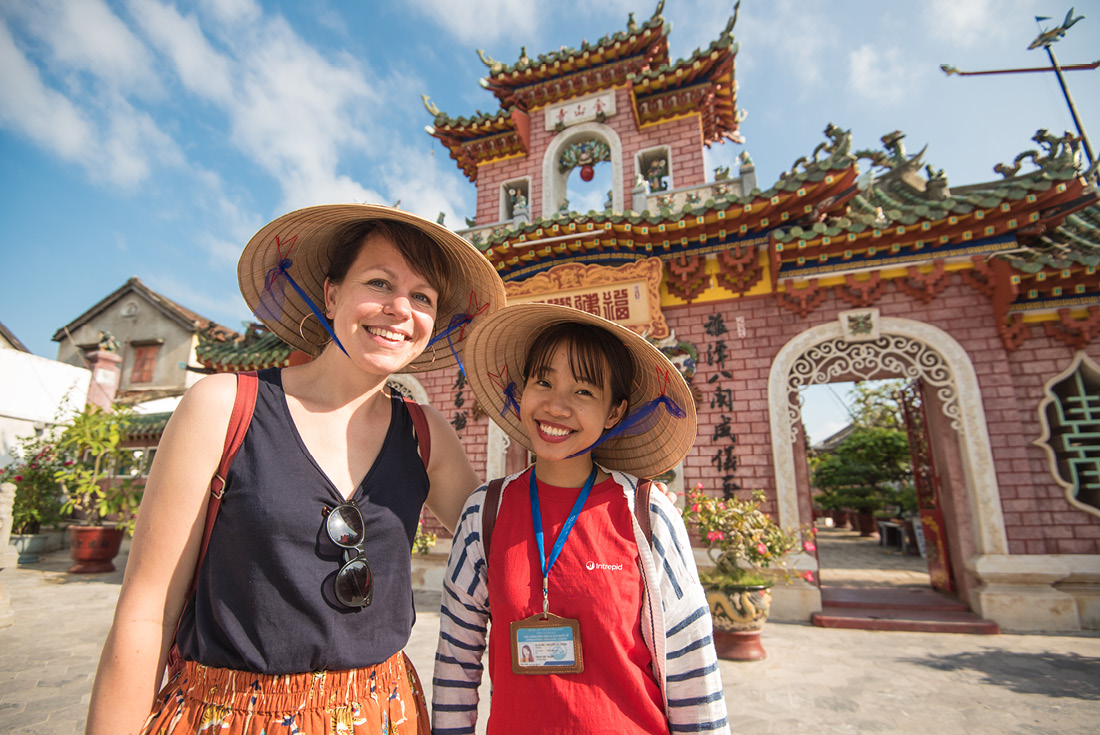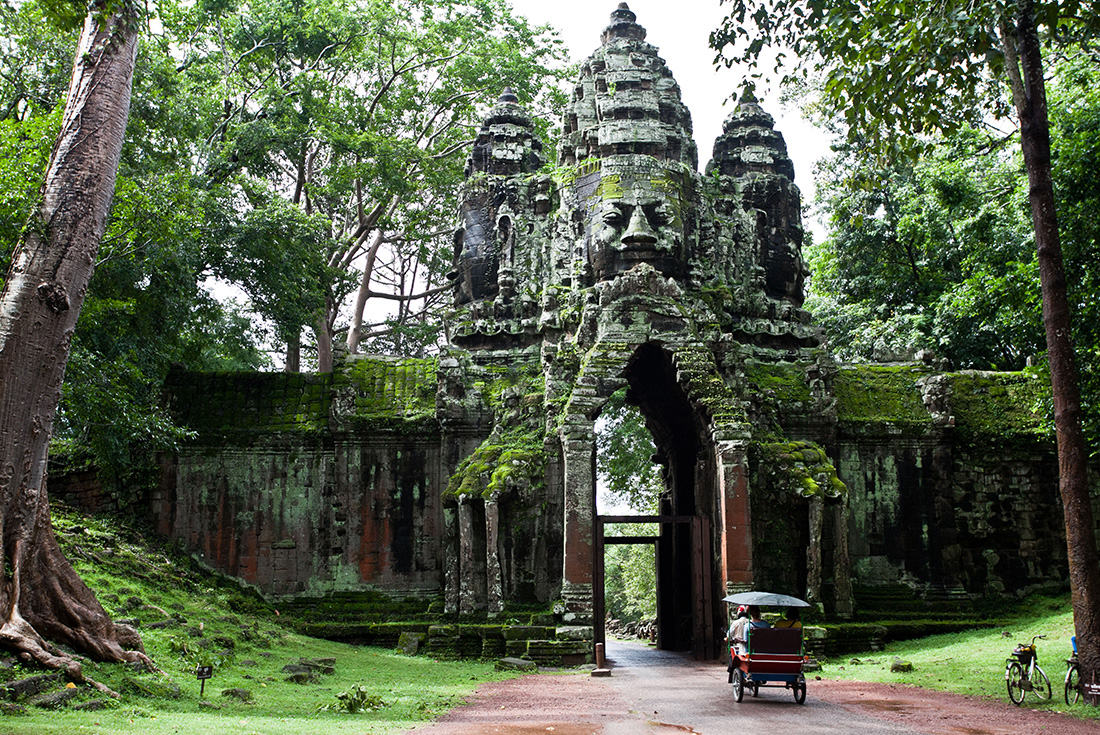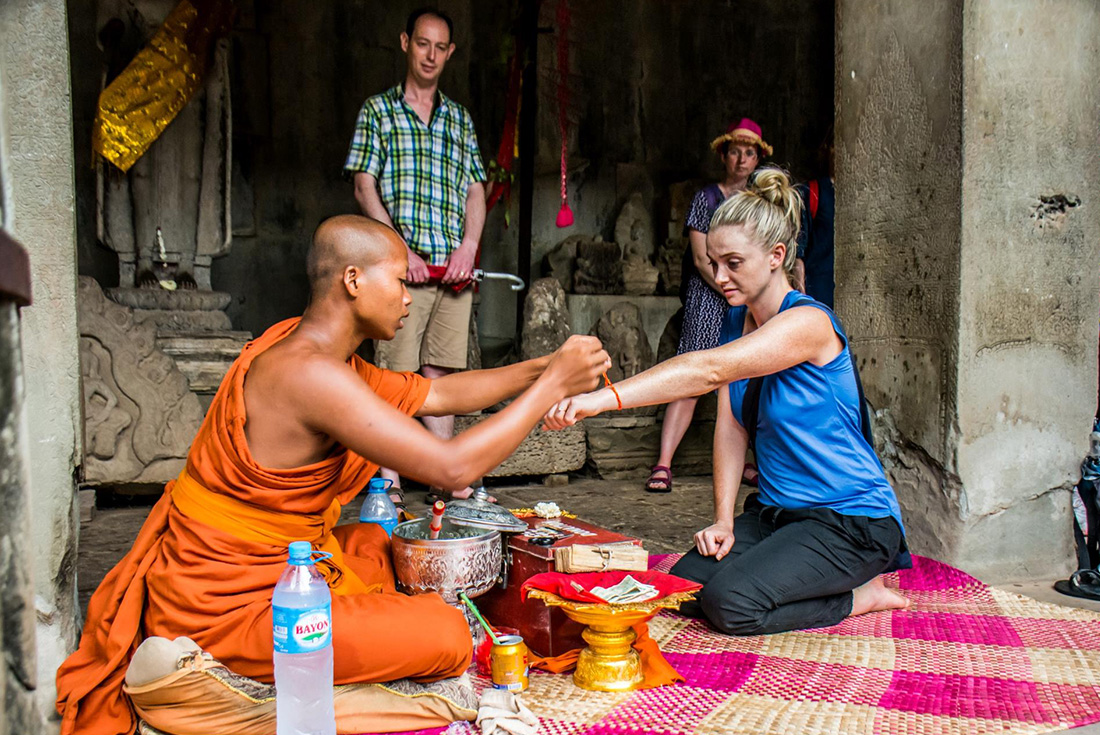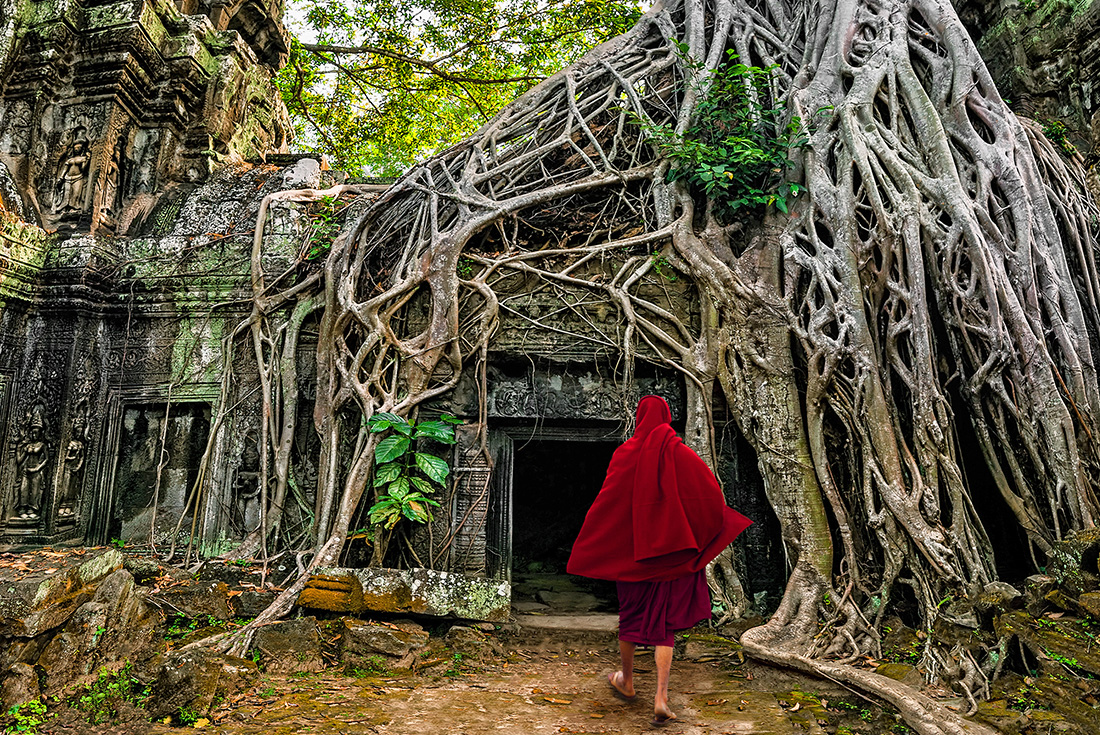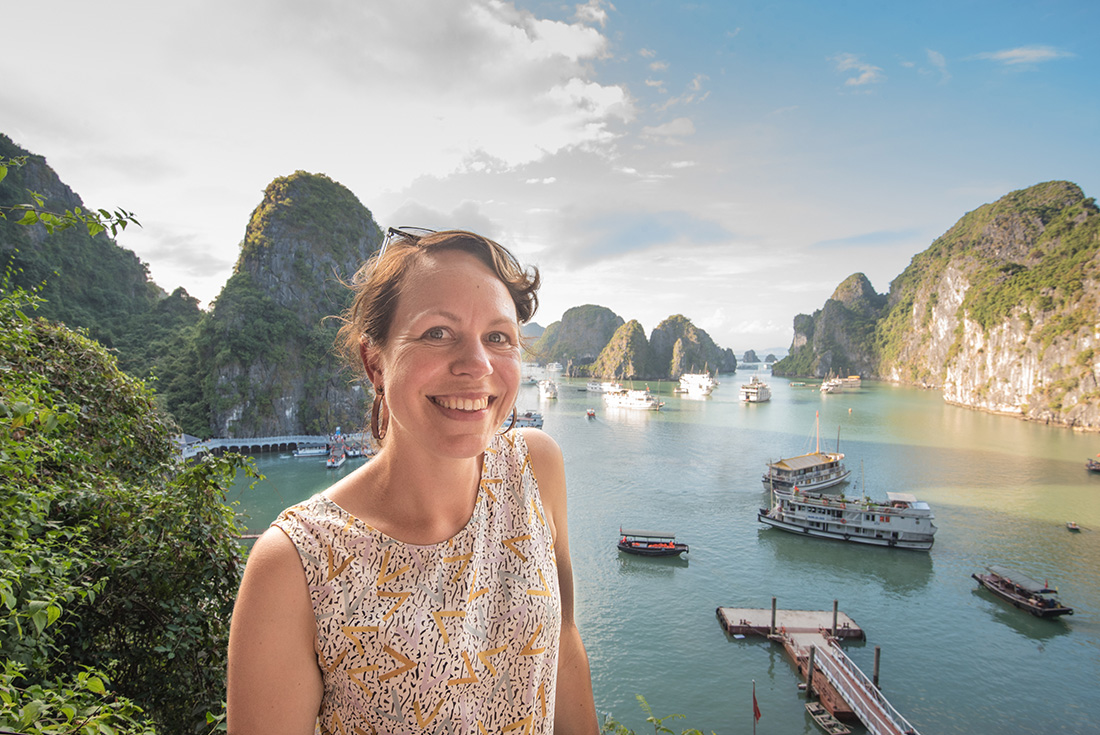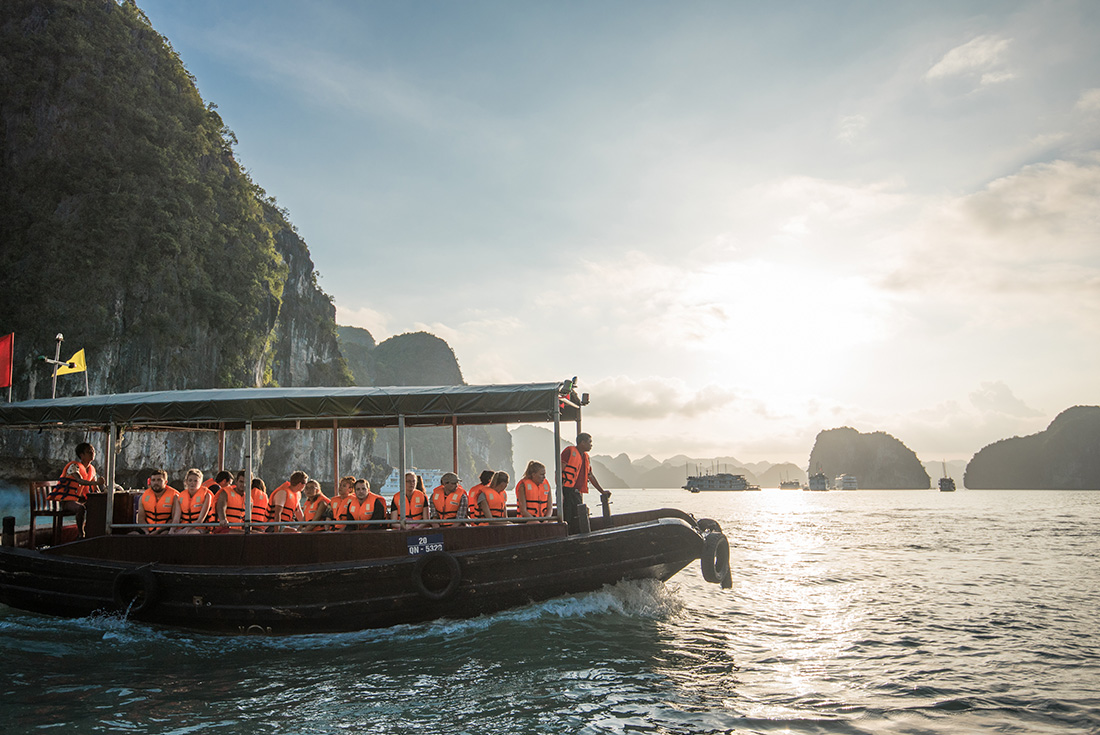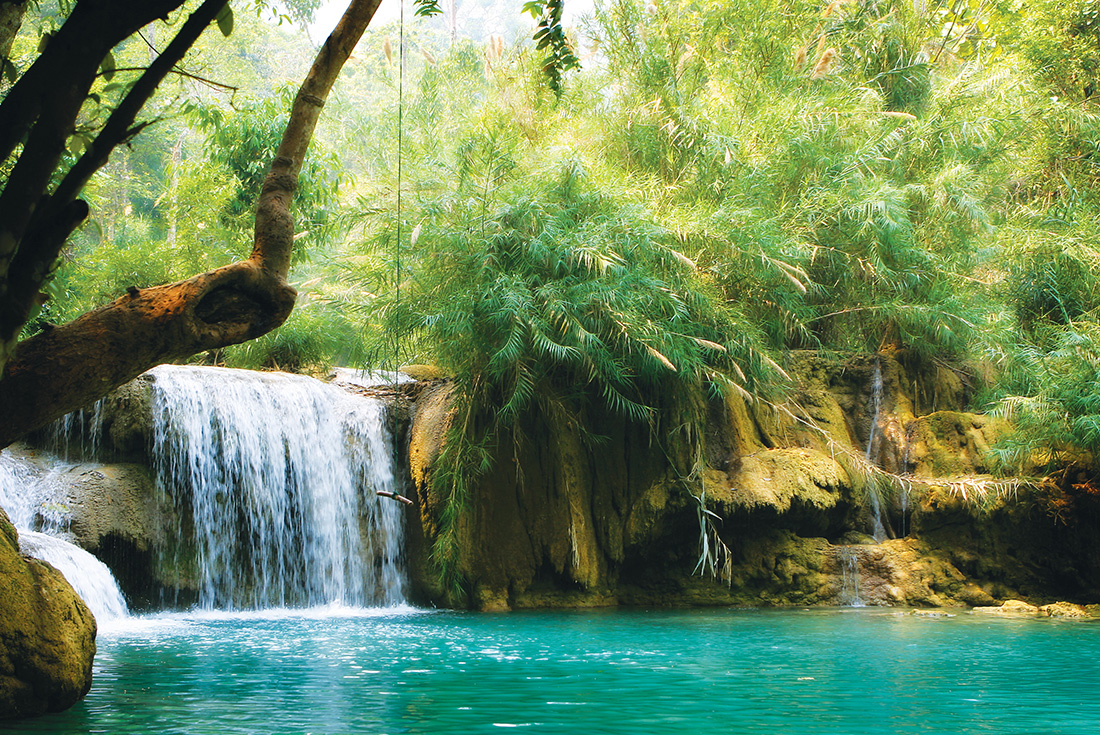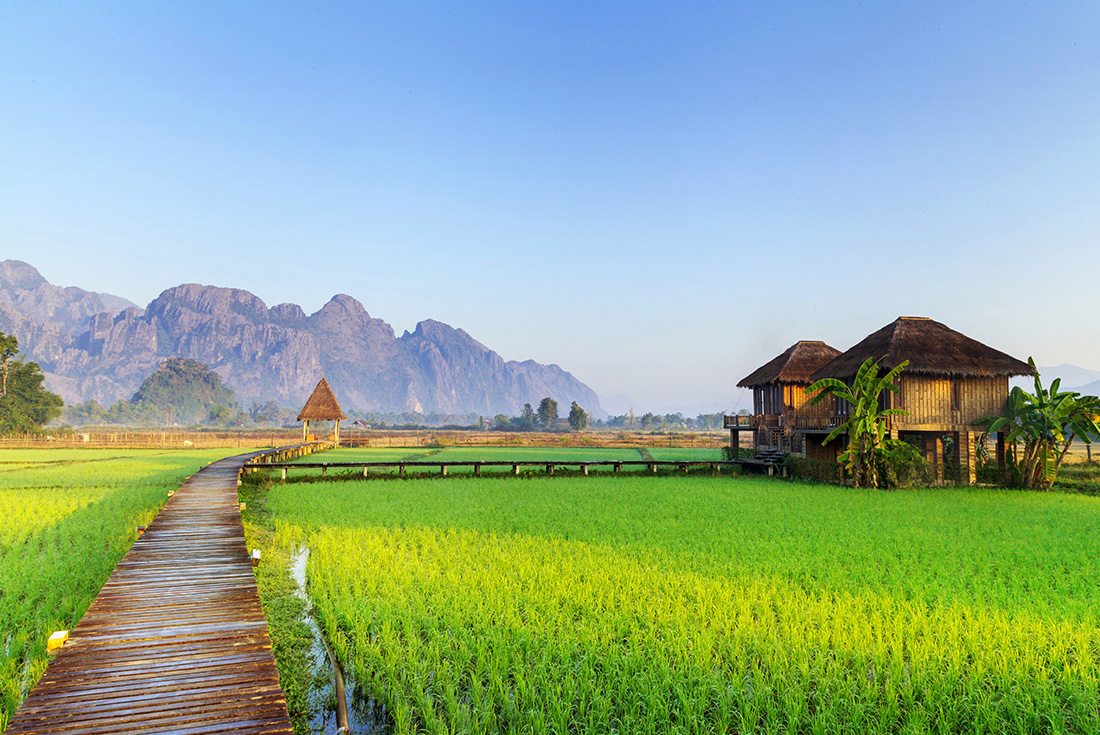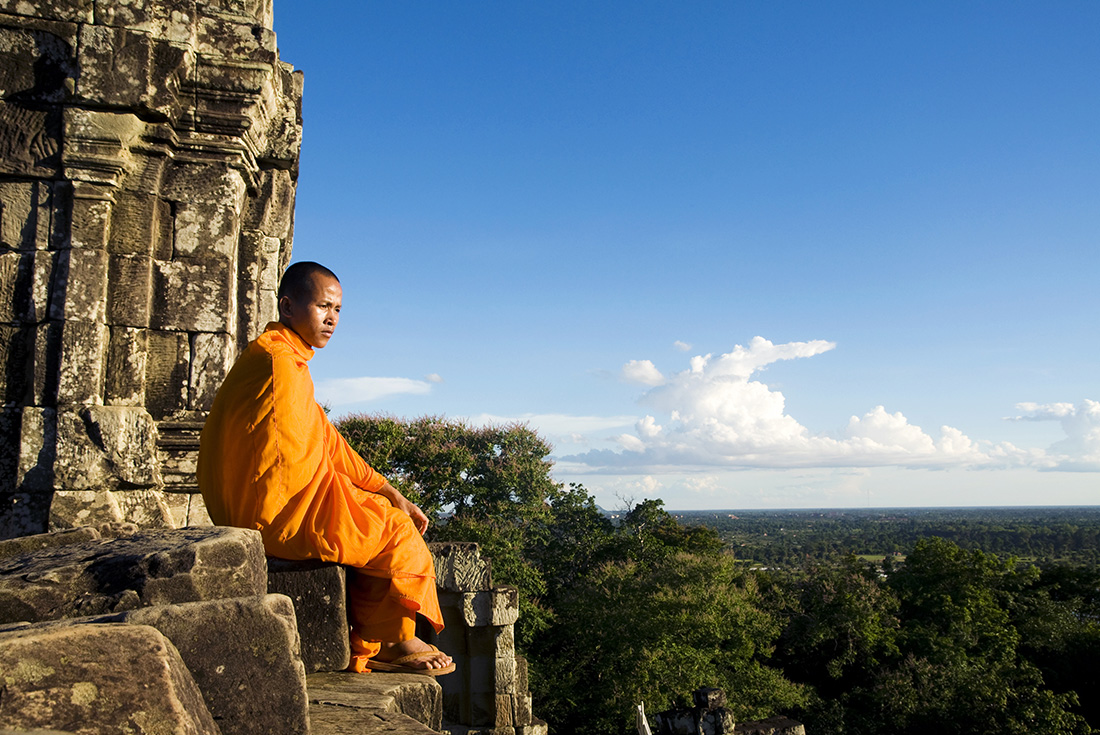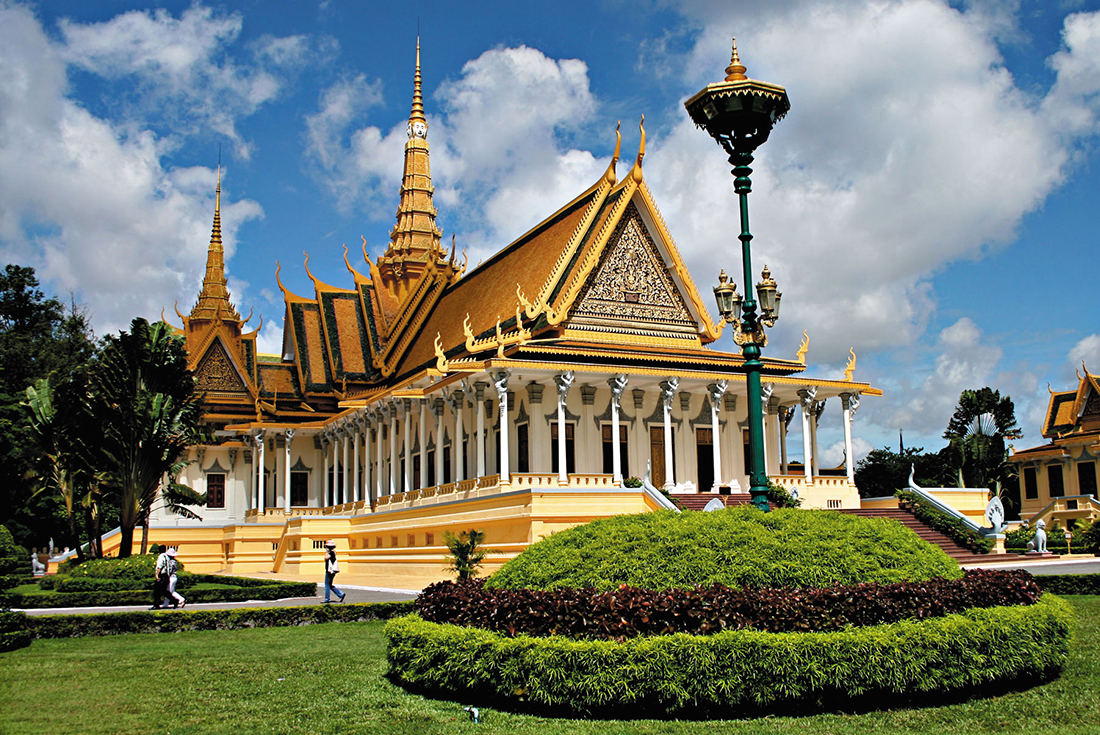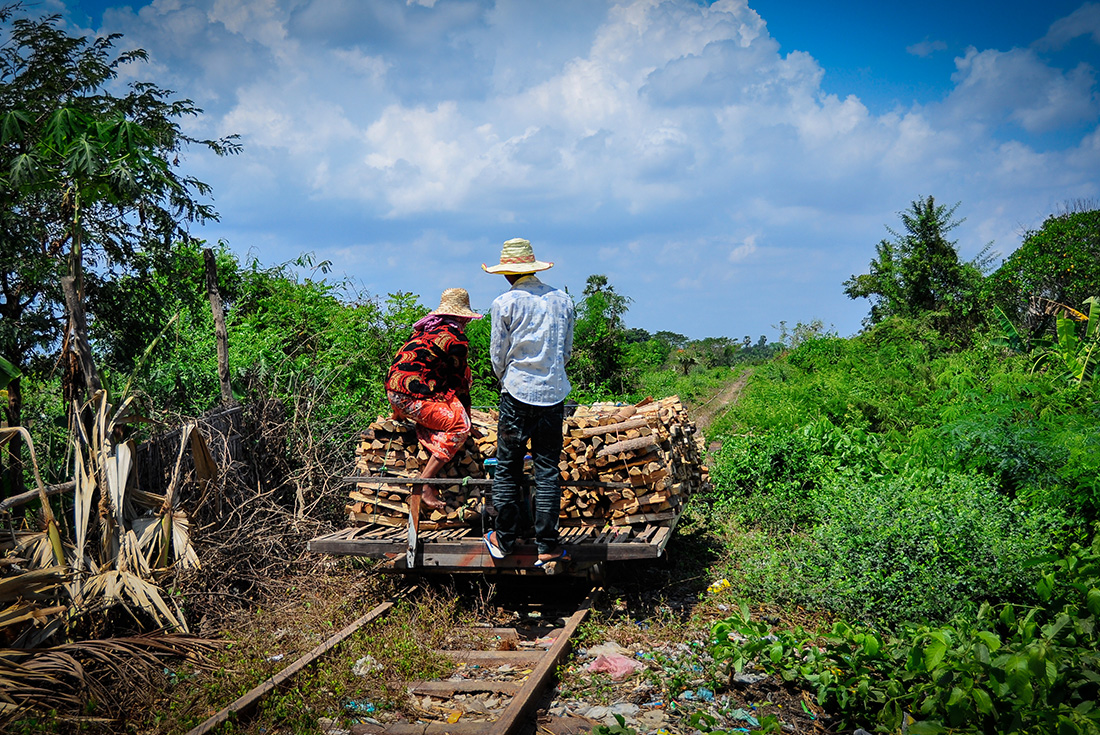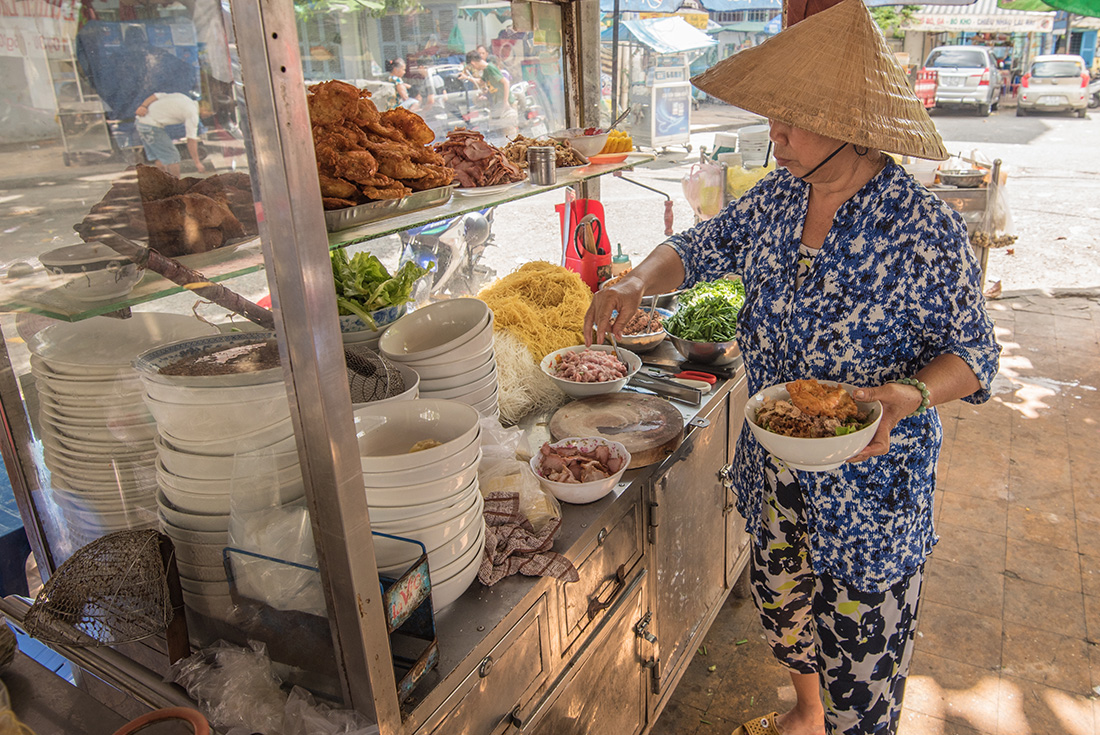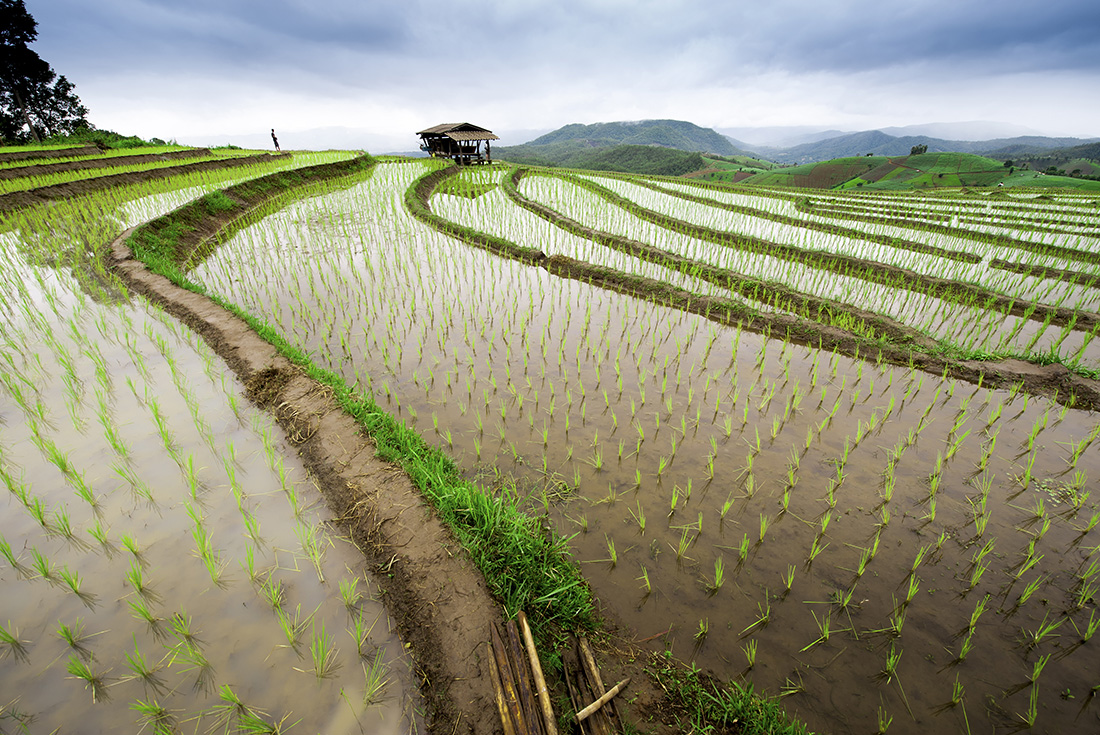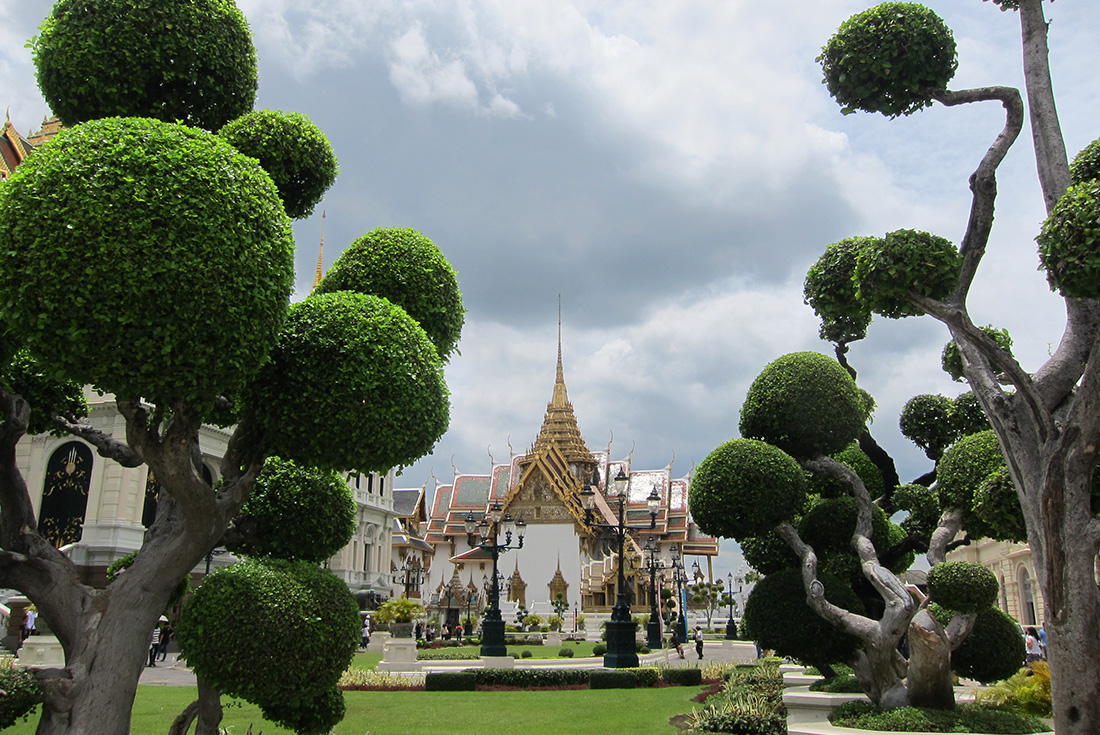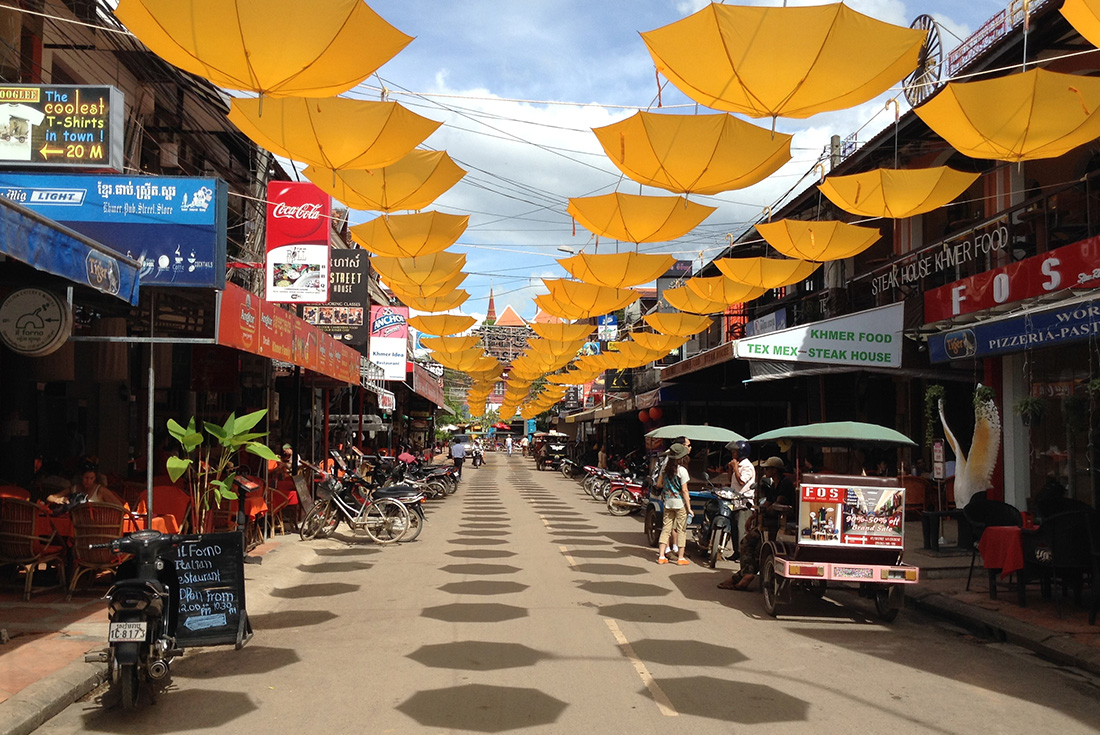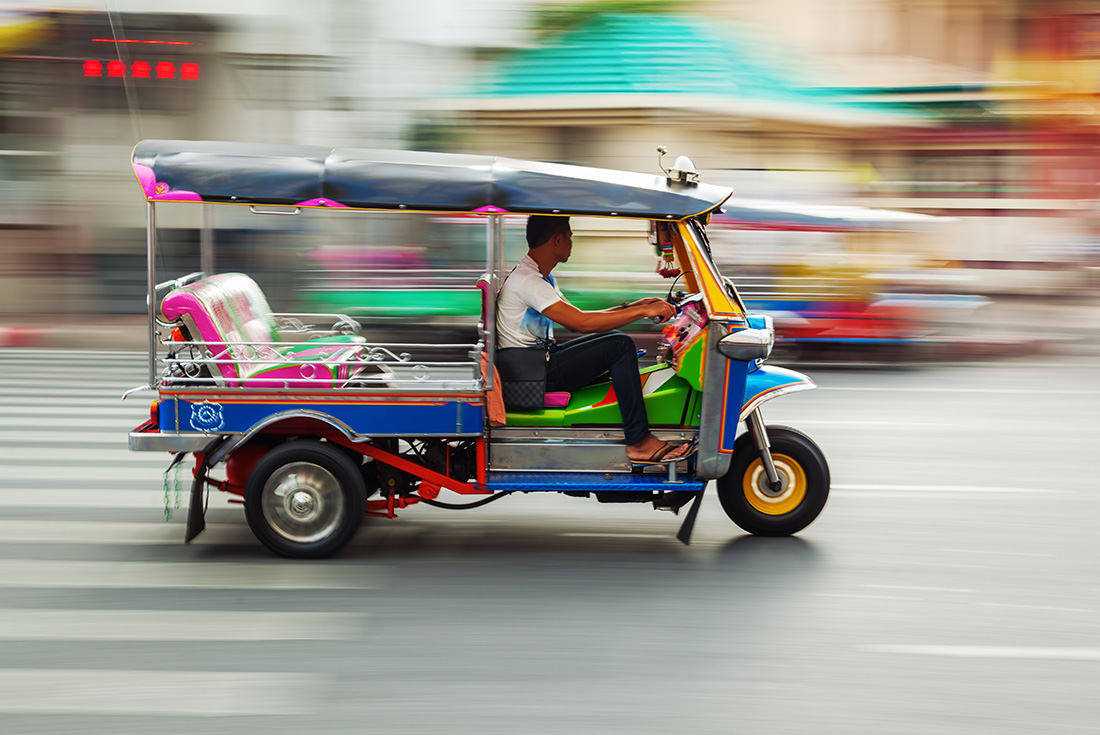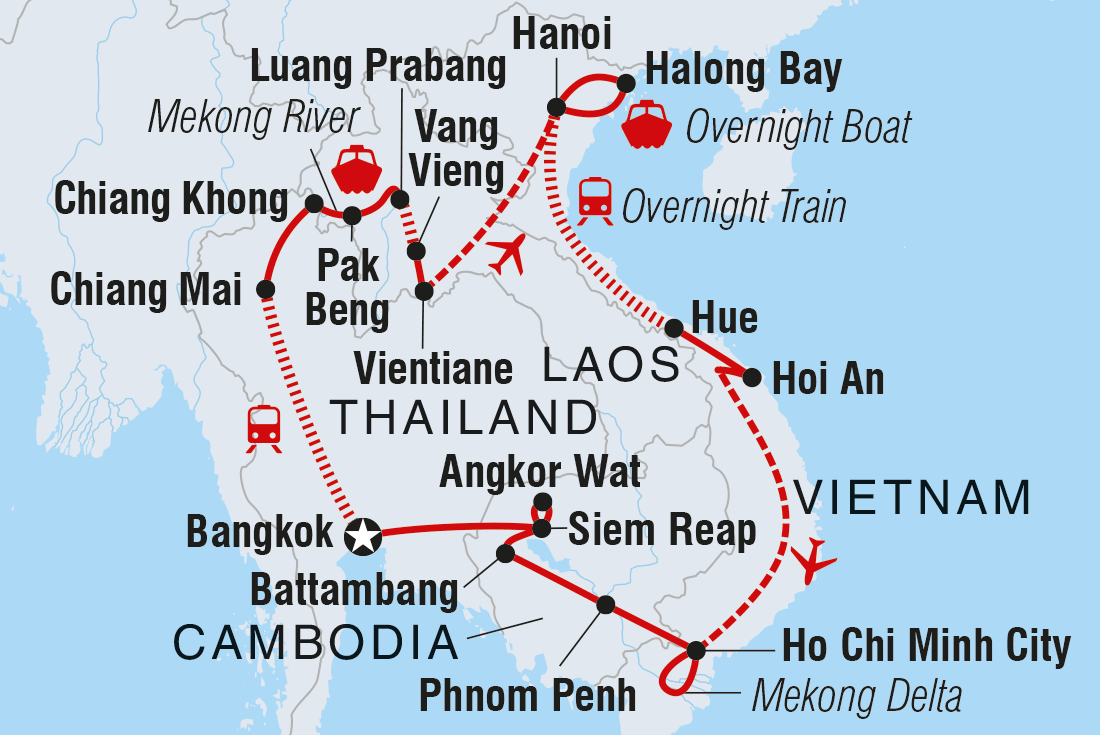South East Asia Loop
South East Asia Loop
Travel into the heart and soul of South East Asia. Starting off in Bangkok, get lost in the chaos of Thailand's capital city before succumbing to the slightly more relaxed pace of Chiang Mai. Cruise along the Mekong River to reach peaceful Luang Prabang, a colourful town dotted with monks, pop-up stalls and French-inspired eateries. In Vietnam, cruise through dramatic karst scenery on a boat tour of Ha Long Bay, travel back to the time of Vietnam’s emperors in Hue, soak up the old-world charm of Hoi An and be wowed by the endless energy of Ho Chi Minh City. Then discover Cambodia's fascinating history and culture in Phnom Penh's bustling streets and in the awe-inspiring temples of Angkor, before wrapping up the adventure back in Thailand.
Tour At a Glance
- Discover the incredible Angkor Wat. As well as a guided tour, you'll also have a pass to cover your whole time in Siem Reap. So you can explore this World Heritage temple complex as much and as often as you like.
- The two-day boat journey down the iconic Mekong River passes incredible rural scenery and is one of the must-dos to truly experience South East Asia.
- Discover the mysterious beauty of the Lao jungle as you walk side by side with recently rescued elephants on stroll through their natural habitat.
- Sample local food wherever you go, from a seafood dinner on Halong Bay, street snacks at markets, a meal at a buddhist nunnery, coconut candy and tropical fruits in the Mekong Delta, and dinner at KOTO restaurant.
- Discover Kampong Luong and the countryside around Battambang with a visit to a floating village and a bike ride around farms and cottage industries.
- Tour code: TTSVC
- Group Adventure
Dates & Prices
Is this trip right for you.
- You'll cover a lot of distance on this trip, including on overnight trains. Accommodation and amenities are shared and basic, but the experience of rubbing shoulders with the locals makes it all worthwhile. For more about what this experience is like, see our blog post here:
- It can be surprisingly cool, especially at night from November to February. Make sure you have some warm gear packed for this period so you can be comfortable. Smoke haze can be common for Northern Thailand into Laos between March and April due to burning off season of crops. You may wish to take a quality mask with you if you are particularly sensitive to smoke.
- Depending on where you come from, the weather in Vietnam might be hotter and more humid than what you are used to. We recommend checking online for what the typical temperatures will be at the time of year you are looking to travel to see what to expect - this page might be useful:
- Laos is less developed than many other South East Asian countries. The roads can be bumpy, delays are common, and accommodation can be basic but always clean and comfortable. A little bit of patience will go a long way towards your enjoyment of this beautiful country!
- Due to dam construction upstream, water levels aren't as reliable as in previous years. When the Mekong River is at its lowest from February to April, part of the journey may occasionally need to be made by land
- There are some long travel days by both private and public transport (up to 10 hours on the road), including the days that we cross from Vietnam to Cambodia and Cambodia to Thailand. Your leader and local guides will assist with the border crossings, but plenty of patience is advised
- At times your accommodation may not have continuous hot water. Most travellers don’t find this a problem however, and are often keen to cool down from the heat with a refreshing cold shower!
Accommodation
- Guesthouse (2 nights)
- Hotel (24 nights)
- Overnight boat (1 night)
- Overnight sleeper train (2 nights)
Joining point instructions
If you want to book an arrival transfer with us, please provide your flight details to us no later than 14 days before departure.
For your confirmed arrival transfer, you’ll be met after exiting the Customs Hall. A transfer representative holding a sign with your name on will meet you at between Exit Door 3-4. If you cannot find your transfer representative, please go to the Information Counter at Exit Door 3. Ask them to call our transfer provider, Ms. Janet, on +66 64 649 0485. Please note that neither the driver nor any representative should ask you for additional payment.
For arrivals at Don Muang International Arrival, when you are at the arrival hall, our representative will be in front of you at Gate 5. Please find the Intrepid Logo and check your name on the signboard held by the representative on your lefthand side. If you have trouble locating our representative, please call our transfer provider Ms. Janet, at +66 64 649 0485. In case of flight cancellations, changes, if you experience severe delays at immigration, baggage collection or customs, or if you are not able to find the driver, please contact our local office on the number in the ‘Problems and emergency contact information’ section.
Metered taxis are available outside the airport entrance on the 1st floor. Exit the Customs Hall, go down to the 1st floor and leave the airport at Gate 3, 4, 7 or 8. You will find a table with a “metred taxis” sign. The taxi fare will be the metred fare plus a surcharge of THB50-THB75 (depending on the driver’s use of toll roads). The total fare will be approx. THB400. Pre-paid taxis are also available, where you will be given a docket to pay the driver a set price of THB700. Please avoid taxi touts who tell you that they have a metered taxi parked outside the airport.
Finish point instructions
- If you have a confirmed departure transfer your leader will advise your pick up time the day before your trip ends.
- Alternatively, please ask your leader or hotel staff for assistance in arranging a taxi or instructions to reach the airport by public transport.
Safety
- Most national governments provide regularly updated foreign travel advice on safety issues involved with international travel. We recommend that you check your government's advice for their latest travel information before departure and ensure that your travel insurance covers you for all destinations and activities on your trip. Please refer to our website's safety page for links to major travel advisories and updates on safety issues affecting our trips here: We strongly recommend the use of a neck wallet or money belt while travelling, for the safe-keeping of your passport, flight tickets, cash and other valuable items. Leave your jewellery at home - you won't need it while travelling. Many of our hotels have safety deposit boxes, which is the most secure way of storing your valuables. A lock is recommended for securing your luggage. Your group leader or local representative will accompany you on all included activities, however, during your trip you'll have some free time to pursue your own interests or relax and take it easy. While your group leader or local representative will assist you with the available options in a given location, please note that any optional activities you undertake are not part of your Intrepid itinerary, and Intrepid makes no representations about the safety of the activity or the standard of the operators running them. Please use your own good judgement when selecting an activity in your free time. Please also note that your group leader or local representative has the authority to amend or cancel any part of the trip itinerary if it's deemed necessary due to safety concerns. Intrepid's operational safety policies can be viewed on our website at the link below. We recommend that you take a moment to read through this information before travelling, and would appreciate any feedback on how safety is being managed on our trips.
- PRECAUTIONS: Please be aware that local laws governing tourism facilities in this region differ from those in your home country and not all the accommodation which we use has a fire exit, fire extinguishers or smoke alarms. SEAT BELTS: Please be aware that local laws governing transportation safety may differ from those in your home country and not all the transport which we use is able to provide seat belts. PETTY THEFT AND PERSONAL SAFETY: While travelling there is always the risk of pick-pocketing and petty theft, particularly in the more touristy cities. We recommend that you exercise caution when walking alone at night and encourage you to walk together and only on main, well-lit thoroughfares. Be particularly vigilant on public transport. Simple measures like carrying your day pack on your front, not hanging your bag over the back of your chair or on the floor and wearing a money belt will reduce any chance that your valuables should go missing. MOTORBIKE BAG SNATCHING: Be particularly aware of motorbike bag snatching, especially in the bigger cities.
- BICYCLE HELMETS Bicycle helmets are not provided on the optional cycling activity in Vang Vieng. If you wish to wear a bike helmet we recommend you bring one from home.
Medical and health information
- All travellers need to be in good physical health in order to participate fully on this trip. For the safety and wellbeing of yourself and others, if you are unwell prior to travelling, please stay at home and contact us to make alternative arrangements.
- When selecting your trip please make sure you have read through the itinerary carefully and assess your ability to manage and enjoy our style of travel. Please note that if in the assessment of our group leader or local representative a traveller is unable to complete the itinerary without undue risk to themselves and/or the rest of the group, we reserve the right to exclude them from all or part of a trip without refund.
- You should consult your doctor for up-to-date medical travel information or for any necessary vaccinations before departure. We recommend that you carry a first aid kit as well as any personal medical requirements in their original packaging as they may not easily be obtained while travelling. If you are carrying medication, ensure you check your government's foreign travel advice for any local restrictions or requirements.
- Mosquito-borne diseases such as dengue fever and Japanese encephalitis are widespread in South East Asia. Malaria is also prevalent in some regions, particularly along the borders in mountainous regions. Take preventative measures such as wearing long clothing, using repellent and being indoors particularly around dusk and dawn. Seek medical advice prior to travel for medication or vaccination advice.
- There have been reports of transmission of the mosquito-borne Zika virus in this region and we advise all travellers to protect themselves from mosquito bites. Given possible transmission of the disease to unborn babies, and taking a very cautious approach, we recommend all women who are pregnant or trying to get pregnant to consult with their doctors before booking their trip.
- Bangkok and other Thai cities experience high levels of air pollution, which may aggravate bronchial, sinus or asthma conditions. These can be particularly high between the months of December and February. Smoke haze, which usually occurs across parts of north and north-east Thailand during March to April, can also aggravate these conditions. You may wish to take a quality mask with you if you are particularly sensitive to smoke. Regular air quality reports are available from the following website
GENERAL HEALTH
MOSQUITO-BORNE ILLNESSES
ZIKA VIRUS
AIR POLLUTION AND SMOKE HAZE
Food and dietary requirements
- While travelling with us you'll experience the vast array of wonderful food available in the world. Your group leader or local representative will be able to suggest restaurants to try during your trip. To give you the maximum flexibility in deciding where, what and with whom to eat, generally not all meals are included in the trip price. This also gives you more budgeting flexibility. As a rule our groups tend to eat together to enable you to taste a larger variety of dishes and enjoy each other's company. If you have dietary requirements and/or food allergies, please let your booking agent know prior to departure.
- At hotels you’ll often have a buffet with choices of Vietnamese and Western food. At homestays you will have more basic breakfasts of local foods, eggs, bread, jam, tea and coffee. Take away breakfasts for early starts may be very simple such as a piece of fruit and a bread roll.
- Check out this guide to eating in Vietnam for vegan, vegetarian, gluten & peanut free travellers
- Travelling in South East Asia with a food allergy? We have some advice for you here
INCLUDED BREAKFASTS
DIETARY REQUIREMENTS
FOOD ALLERGIES
Important Notes
- What you need to bring will vary according to the trip style you have chosen, the countries you are visiting and when you are travelling. Generally speaking, we recommend you pack as lightly as possible and make sure that you are able to carry and lift your own luggage and walk with it for short distances or up or down a flight of stairs. Our travellers usually find the smaller their luggage is, the more they enjoy the trip not having to worry about carrying heavy bags! Aim to keep your main luggage under 15kg.
- Many travellers carry their luggage in a compact smaller suitcase or backpack with wheels. We recommend your bag has carry straps or handles so it is easy to lift and carry for the times you are unable to wheel it (ie. on rough surfaces or up steps).
- If you are taking overnight trains, or primarily using public transport then the smaller your luggage the easier it will be to store under or above bunks. Large suitcases may not be able to be taken on board. A lockable bag or small padlock for your bag will be useful especially when travelling on public transportation as well.
- You'll also need a day pack/bag to carry water, camera, swimming suit, waterproof pouch/bag for phone, hiking shoes and jacket etc. when you’re exploring during the day.
- Below we have listed the essentials for this trip
- Please bring your own water bottle to refill along the way. Although it can be difficult to avoid bottled water when travelling, please use the water dispensers which are provided on some of our vehicles and at some of our accommodation. Your group leader or local representative will advise whether tap water is safe to drink in your destination, and if it is, you can simply refill it with tap water. When unable to avoid bottled water, it is better to buy the largest available and distribute it into your smaller bottle for the day. If you are walking or trekking as part of your trip you will need to carry at least 2L of water with you.
- Checked luggage allowance is a maximum 20kg, with up to 7kg carry on luggage. Any excess luggage charges can be paid directly to the airline at check-in.
- When packing be aware that dress standards are conservative throughout Asia, especially outside major cities. To respect this and for your own comfort, we strongly recommend modest clothing. This means clothing that covers your shoulders and knees. Loose, lightweight, long clothing is both respectful and cool in the predominantly hot Asian climate. In many rural areas in Asia women will need to wear modest clothing even to swim. Singlets, tank tops and topless sun bathing are all unacceptable. When visiting religious sites men often need to wear long trousers and women a long skirt or sarong.
BOTTLE
INTERNAL FLIGHT LUGGAGE ALLOWANCE
LOCAL DRESS
Passport and visas
PASSPORT
You’ll need a valid passport to travel internationally and most countries require your passport to have a minimum of 6 months validity, so remember to check the expiry date.
We need your passport information to get everything ready for your trip so it’s important that the information on your booking matches your passport exactly. Please take care to provide the correct details. We recommend carrying a copy of the photo page of your passport while travelling and leaving a copy at home with family or friends.
VISAS & ENTRY REQUIREMENTS
Many countries require a visa and obtaining the correct visa for your trip and any countries you may transit through is your responsibility. We recommend you check your visa requirements as soon as you have booked your trip. This will ensure you have time to prepare your documents and for your visa application to be processed. You can check the entry requirements for your nationality on your government's foreign travel advisories, consular websites or on our page here: www.intrepidtravel.com/visa-entry-requirements
DUAL PASSPORT HOLDERS
For travel between countries in South East Asia you will need to travel on the same passport for all border crossings. Immigration authorities will need to see entry and exit from the previous country before allowing you to enter their country.
E-VISAS AND OVERLAND BORDER CROSSINGS
Holders of a Cambodian or Vietnamese E-Visa may be required to pay an extra service fee when crossing overland between the two countries. This fee is charged by local bus companies as a service fee and will be between USD1-3, subject to change. Please ensure that you have adequate USD in cash for this fee.
Your visa application form may require you to state the dates on which you enter and exit that country. We suggest you list your date of entry a few days before, and date of exit a few days after, your intended dates in case you encounter any delays or problems en route. The following are the international/administrative border crossings for this trip:
On Day 6 we cross the Lao-Thai Friendship Bridge IV border from Thailand to Laos via minivan:
The Thai border is Chiangkhong.
The Laos border is at Houy Xai.
On Day 13 we fly from Laos to Vietnam:
We depart from Vientiane, Laos.
We arrive in Hanoi, Vietnam.
On Day 23 we cross the border from Vietnam to Cambodia:
The Vietnamese border is Moc Bai.
The Cambodian border is Ba Vet.
On Day 29 we cross the border from Cambodia to Thailand:
The Cambodian border is Poipet.
The Thai border is Aranyaprathet.
LAOS Visa on Arrival
Evisa is recommended for Laos but If you plan to get an visa on arrival at the border, please ensure that you have at least 1 passport photo and up to USD45 cash for your application. Please provide your sales agent with accurate passport details prior to the departure of your trip as these details will be passed on to your leader to help speed up the process. Those without a photo, or who are arriving on a weekend, holiday or after hours, will have to pay an additional one or two dollars. All visa fees are payable in cash only.
HOTEL ADDRESS FOR LAOS VISA APPLICATION
If you require a hotel address for your visa application please use:
BKC Villa 2
Ban Pakbeng 1
Oudomxay
Laos
Ph: +856 20 55 118 080
LOCAL CONTACT INFORMATION FOR LAOS VISA APPLICATION
If you require a local contact for your visa application please use:
Mr. Vimansawanh Nouanesengsy
Address: Ban Sokkham
20 Sokkham Rd
Saysettha district
Vientaine
Lao PDR
Ph: +856 20 555 03065
ADDRESS FOR VIETNAM VISA APPLICATIONS
If you require an address for your visa application please use:
Intrepid Vietnam
Ground Floor, Ladeco Building
266 Doi Can St
Ba Dinh District, Hanoi
Vietnam
Ph +84 4 3715 0996
ADDRESS FOR CAMBODIA VISA APPLICATIONS
If you require an address for your visa application, please use:
Intrepid Cambodia
92 Taneuy Street
Wat Bo Village
Siem Reap
To help calculate the exact dates of these crossings we have found the following website to be very useful -
Travel insurance
Travel insurance is compulsory on all our trips for those travelling internationally. We require that at a minimum you are covered for medical expenses including emergency repatriation. If you are travelling within your home country or region please confirm before travel that you are entitled to access the public medical system easily should an accident occur. We strongly recommend all travellers have a policy that also covers personal liability, cancellation, curtailment and loss of luggage or personal effects. For international trips, you will not be permitted to join the group until evidence of travel insurance and the insurance company's 24-hour emergency contact number has been sighted by your group leader or local representative.
If you have credit card insurance your group leader or local representative will require details of the participating insurer/underwriter, the level of coverage, policy number, and emergency contact number rather than the bank's name and your credit card details. Please contact your bank for these details prior to arriving in-country.
For travellers who reside within the European Union, Switzerland or USA the requirement to purchase travel insurance cannot be compulsory. However the purchase of travel insurance is still highly recommended, and travellers from these regions who decline travel insurance when travelling outside of their home region must sign a Travel Insurance Waiver Form at the Group Meeting, recognizing personal responsibility for emergency medical and repatriation costs should they arise.
For assistance with travel insurance or other services, please visit the link below:
MOTORBIKE INCLUDED ACTIVITY:
Please note that for this particular trip, your travel insurance must also cover riding pillion on a motorbike. The motorbikes used are 125cc or less.
Responsible travel
Our Responsible Travel Policy outlines our commitment to preserving the environment, supporting local communities, protecting the vulnerable, and giving back to the places we travel. All our trip group leaders or local representatives, suppliers, and staff are trained on these principles and are core to us delivering sustainable, experience-rich travel.
Explore the different parts of our Responsible Travel Policy by visiting:
ELEPHANT PERFORMANCES & ELEPHANT RIDING:
While we respect each individual’s decisions while travelling, Intrepid does not include elephant rides or unnatural performance activities on any itinerary, and we recommend you bypass these activities should they be offered to you during your stay. Professional wildlife conservation and animal welfare organisations, including World Animal Protection, advise that contrary to common belief, captive elephants remain wild animals and despite good intentions, unfortunately, many venues are unable to provide the appropriate living conditions elephants require and this ultimately impacts their well-being. While there is some merit in the argument that the money you pay for the activity goes towards keeping the elephants and their mahouts employed, we know that it also fuels demand for elephants to be captured in the wild or captive-bred. We thank you for your support in improving the welfare of these majestic creatures. Further information is available on the below link:
ORPHANAGE TOURISM
In recent times orphanage tourism has become increasingly popular in Cambodia. Orphanage tourism is what happens when good intentions and reality don’t quite synch up. Travellers who visit and volunteer in orphanages may genuinely want to help, but their efforts can often perpetuate a system where children are separated from their families and, in some cases, abused. That’s why we don't include visits to orphanages on any of our trips. For more on our position on orphanage tourism and the work we are doing to protect children in the countries we visit, see these links below:
Climate and seasonal
SONGKRAN FESTIVAL
The Songkran Festival is celebrated to mark the New Year. The festival runs from the 13th to the 16th of April. Traditionally houses and villages are properly cleaned in preparation for the New Year, flowers are gathered to decorate Buddha images, young people pour water over the elders for good luck. Songkran Festival is often referred to as the “water festival” as it is now common to throw water over each other during the festival period. Our advice is to be prepared to get wet! Your group leader or local representative will discuss the festival activities upon day one at the group meeting.
LAOS FLOODING & LANDSLIDES:
The rainy season in Laos normally runs from May to October, coinciding with the typhoon season in South East Asia. Mountain areas are particularly vulnerable to landslides in the rainy season and flooding may occur along the Mekong river basins and elsewhere. Occasionally roads between Luang Prabang, Vang Vieng and Vientiane may be closed suddenly due to road conditions. Should this occur, your itinerary may be rerouted to fly between destinations and you will need to use your contingency funds to cover the cost of this change.
TET
8 - 14 February 2024, 28 January - 3 February 2025
Tet is Vietnam’s New Year festival which takes place in late January/early February based on the lunar calendar and is the most important celebration of the year. While this can be a fascinating time to be in Vietnam, you do need to be prepared for some businesses to be closed, tourist sites to be very busy and for transport to be packed as many Vietnamese are travelling around the country. Although we do our best to run trips during Tet as per the scheduled itinerary, it is likely that there will be some changes to transport, accommodation or order of destinations visited. Due to the high demand on tickets at this time, flights and overnight trains may on occasion need to be replaced with day buses. We will aim to communicate any known changes prior to your departure.
WEATHER IN VIETNAM
The most popular times to visit Vietnam are spring (February-April) and autumn (September-December) but because of the huge variations in latitude and altitude, there is no one best time to go to Vietnam. Temperatures vary from 4°C (39°F) in Sapa in winter to humid 36°C (97°F) days in Saigon in the middle of the dry season. The monsoons bring heavy rain to the south, and a cooler winter to the north. It’s a good destination all year.
WET SEASON
Flooding is common across Vietnam during rainy season (June-December) and could also lead to landslides. Typhoons are also common during this period. During these months there may be disruptions to transport and some activities or destinations may need to be changed as a result at short notice.
WEATHER IN CAMBODIA
Any time of the year is a good time to travel in Cambodia, with each season having its advantages. The climate in Cambodia is generally hot and humid throughout the year. Temperatures stay in the 30Cs most of the year, dropping back to the 20Cs at night. There are officially two seasons in Cambodia – wet and dry. During November to May you can expect dry conditions, while June to October will have wetter weather.
SEASONAL FLOODING IN CAMBODIA
Severe storms and widespread seasonal flooding, including localised flash flooding, can occur without warning in Cambodia, particularly during the local wet season from July to November. The Cambodia/Thailand land border is occasionally closed due to flooding. Should land travel be disrupted and we need to fly, travellers will need to use their contingency funds to cover any additional costs.
During public holidays and festival periods in Cambodia some businesses may close, transport may be extremely busy and travel times may increase. The main holidays in Cambodia are:
Chinese New Year (09-12 February 2024)
Khmer New Year (13 - 16 April 2024)
Royal Birthday of the King Sihamoni (14 May 2024)
Pchum Ben Day (01 – 03 October 2024)
Water & Moon Festival (14 -16 November 2024)
Feedback
Can’t stop thinking about your adventure? Tell us all about it! We read each piece of feedback carefully and use it to make improvements for travellers like you. Share your experience with us at:
* Offer valid for selected dates | Subject to Availability | Terms and Conditions Apply
Why our customers love us...

Offering dependable travel solutions from the UK to the world over since 1984, we've gained the trust of a loyal customer base. Our customers know they can rely on us to offer the best prices and to provide impartial, expert advice on finding travel solutions to match their interests, time and budget.
Why book with Southall Travel?
- Exclusive deals for hundreds of destinations
- 24/7 expert assistance
- Price Match Guarantee*
- No fee on credit & debit card transactions
- ATOL protected
- Flexible payment options
- Low deposits
- *within 24 hours of booking
Talk to our Travel Expert
![]() Chat Online
Chat Online
With a Travel Expert
What our customers say...
Subscribe for latest deals
Sign up now and get the best holiday and flight deals straight in your inbox!
Visit www.gov.uk/foriegn-travel-advice for latest destination travel advice from the Foreign Commonwealth & Development Office (FCDO) including Covid19 travel advice, security and local laws, and passport and visa information.


